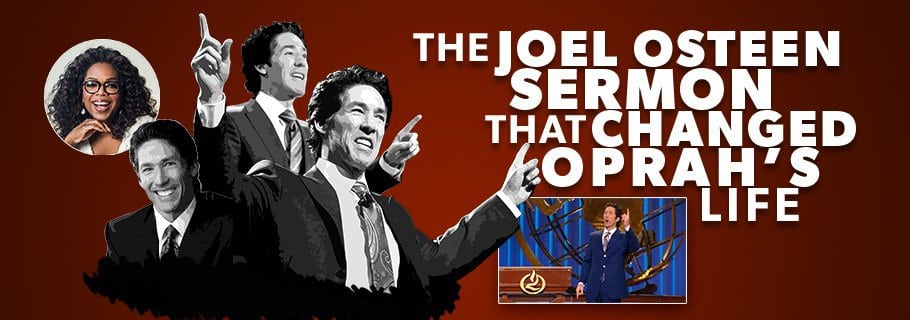This marks the final entry in a series of videos I’ve very much enjoyed putting together: The Great Sermon Series. And for this last video we are going in a different direction by looking at a not-so-great sermon. Joel Osteen’s “The Power of I Am” may be the most popular sermon on YouTube, but it’s also got to be the worst.
(Written by Tim Challies & Joey Schwartz; produced by Thaddeus Maharaj)
Transcript
Tim: In this video series, we’ve been exploring great sermons that have made a widespread impact and stuck around for the long haul. These are sermons that feed your soul and stir your emotions. They’re the sermons that leave you breathless. The sermons that change your life, that stay in your mind forever. Here’s a warning for today’s sermon: if you love the Word of God and you treasure the Gospel of Jesus Christ, this one is guaranteed to stir up some kind of emotion. It may take your breath away as you gasp in horror and disbelief. And if you watch all the way through, it will definitely stay burned in your mind.
Joel: When you get up in the morning and look in the mirror, instead of complaining, you should be saying, I am fearfully and wonderfully made, I am attractive, I am getting younger. You talk like that and God will renew your youth.
Tim: For this sermon, we’re taking a different approach. We’re going to look at the number one sermon on YouTube. This one has over three million views. This is a sermon Oprah Winfrey shared on her YouTube channel after saying, this one changed the way she see’s her life. And we’re going to see why, despite all of the praise, it is truly, truly terrible. What makes Joel Osteen’s The Power of I Am such a flaming dumpster-fier of a sermon? Let’s take a closer look.
Osteen’s sermon starts on a positive note. He has the congregation hold up their Bibles and say a pledge together.
Joel: Hold up your Bible, say it like you mean it. This is my Bible, I am what it says I am, I have what it says I have, I can do what it says I can do. Today I will be taught the Word of God. I boldly confess, my mind is alert, my heart is receptive, I will never be the same, in Jesus name. God bless you.
Tim: Thousands of listeners say together, today I will be taught the Word of God. Unfortunately, over the next 28 minutes, that could not be further from the truth. Osteen ignores the Bible. He’s got no text at the heart of the sermon and he only quotes it haphazardly. He misuses the Bible. He butchers some of its stories, like saying that God’s promise to Abraham was only fulfilled when his wife Sarah elevated her self-esteem and changed her I am’s. He ignores the Bible, he misuses the Bible, but he most certainly does not teach the Bible. There are so many problems jam-packed into this wretched little sermon that we could go on all day. But we’ll boil it down to just three reasons this sermon is so very, very bad.
First, the Gospel of Jesus Christ is distorted. I understand it’s no small accusation to say that Osteen is distorting the Gospel. After all, the apostle Paul in Galatians 1, verse 9, insists, that those who preach a different gospel are under the curse of God.
So, let’s be clear about what the Gospel is. The Gospel of Jesus Christ is that, first, humanity’s great problem is that in our sin against God we are separated from Him and we are under His wrath. And two, that God’s solution for us is to believe in Jesus Christ who lived a righteous life and paid the full penalty for His people’s sins in their place. That is the Gospel. So, what does Osteen teach? Just listen as he gives his main point.
Joel: Here’s the principle: what follows the I am, will always come looking for you. When you say, I am so clumsy, clumsiness comes looking for you. I am so old, wrinkles come looking for you. I am so overweight, calories come looking for you. It’s just like you’re inviting them. Whatever you follow the I am with, you’re handing it an invitation, opening the door, giving it permission to be in your life.
Tim: Rather than the foundational problem with humanity being our sin, Osteen teaches that our foundational problem is one of self-esteem. We don’t think highly enough of ourselves, we don’t see ourselves as being as great as we truly are. So, what’s the solution for this kind of self-esteem problem? Well, he’s happy to guide us.
Joel: Get up in the morning and invite good things into your life. I am blessed, I am strong, I am talented, I am disciplined, I am focused, I am prosperous. When you talk like that, talent gets summoned by Almighty God, go find that person. Health, strength, abundance, discipline starts heading your way.
Tim: Instead of faith in Jesus Christ being the solution for man, Osteen has different ideas. We ought to look in the mirror, we have to see our own amazingness there. And then, then we will be amazing. For Osteen, the solution is within us, rather than outside of us. The solution is in our minds rather than in our God. We do not need an awesome God for salvation, we simply need to remember that we ourselves are awesome. According to Osteen, the problem at the heart of humanity is one of self-esteem and the solution is to elevate our self-esteem, to believe in ourselves, to change our I am’s. See, he believes that words have the power to change reality. So we need to speak the right words and then believe those words and see how the world then conforms to those words. This is why we need to keep saying, I am young, I am beautiful, I am wealthy. What we believe, we speak, and what we speak, we create. This is not the Gospel of Jesus Christ. This is not even Christianity. This is just a new variation of the law of attraction mixed up with some of the power of positive thinking and this hefty dose of prosperity theology thrown in. It makes the good news of Jesus Christ essentially irrelevant since humanity doesn’t even really need salvation. We have everything we need within ourselves to flourish in this life and in the life to come.
The second reason the sermon is so very, very bad, is that the character of Jesus Christ is inverted. Osteen doesn’t merely fall short of displaying and proclaiming the true character of Jesus, he actually flips Him right around, so that he teaches people the exact opposite of what Jesus Christ taught.
Joel: But how many people, when they wake up in the morning, look in the mirror, the first thing they say, I am so old, I am so wrinkled, I am so worn out? You are inviting oldness, you’re inviting fatigue. Do us all a favor, stop inviting that. When you get up in the morning, look in the mirror, instead of complaining, you should be saying, I am fearfully and wonderfully made, I am attractive, I am getting younger. You talk like that, and God will renew your youth.
Tim: Let’s imagine for a moment that our words really do create our reality. Let me ask this, what kind of a reality would a true Christian want to create? Wouldn’t he want to create a reality in which he’s displaying Christian character, in which he’s displaying Christian maturity? Yet, how often does Osteen encourage his people to declare, I am holy, I am godly, I am humble, I am generous? Never. Because he’s only concerned for what’s on the surface. He constantly tells the congregation, especially the women to say, I am beautiful, I am attractive, I am young, I am prosperous, so that they’ll begin to look beautiful and look attractive and look young and be prosperous. The reality he wants them to call into existence is so superficial. It can’t be reconciled with, let’s say 1st Samuel chapter 16, verse 7, “Man looks on the outward appearance, but the Lord looks on the heart.” Or how about the prophecy about Jesus in Isaiah chapter 53, verse 2, “He had no form or majesty that we should look at Him”, that’s Jesus, “and no beauty that we should desire Him.” What truly concerns God, is not our appearance, but our character.
For another example, watch how Osteen tells his people to deal with weakness.
Joel: That’s why there are forces constantly trying to make us feel intimidated, inferior, unqualified. And if you’re going to fulfill your destiny, you’ve got to shake off the negative voices, shake off the thoughts that are telling you, I am unable, I am unqualified. No, don’t invite weakness in.
Tim: Osteen insists we shouldn’t accept any form of weakness. Instead, we should remind ourselves that we are strong, we are able, we are qualified. But, how does this fit with Romans chapter 5, verse 6, “For while we were still weak, at the right time, Christ died for the ungodly.” Christ died for the weak, not the strong. Would Osteen be okay with Paul’s words in 2nd Corinthians chapter 12, verse 9, “But He said to me,” Christ said to me, “My grace is sufficient for you, my power is made perfect in weakness.” Paul says, “therefore, I will boast all the more gladly of my weakness so that the power of Christ may rest on me.” Instead of exhorting his people toward holy pursuits like inner character and godliness and humble dependence, Osteen appeals only to their felt needs of outer beauty and self-sufficiency. He inverts the character of Jesus. He calls people toward worldliness and away from true Christlikeness.
Perhaps I’m being unfair. Why would I critique a man who says he loves Jesus? Shouldn’t love compel me to assume the best of him and to give him the benefit of the doubt? Aren’t we all on the same team for Jesus? Okay, let’s do that. Let’s give Joel Osteen the benefit of the doubt. To be fair, to make sure we’re being fair, let’s go back over the sermon, and we’ll just watch together all the clips where Osteen talks about Jesus.
You can’t make this stuff up. Between the Bible pledge at the beginning of the sermon and the sinner’s prayer at the end of the sermon, Osteen mentions the name of Jesus a grand total of zero times. Do you see what he’s doing? He’s telling his church how to live without ever once referencing the greatest man who ever lived, the one who shows us how to live.
And this is the third reason this sermon is not great. The name of Jesus Christ is missing. This is astounding. But when you think about the content of the sermon, it actually makes sense. How can you mention the name of Jesus, who became poor for our sake, when you’re obsessed with getting rich in the name of God? How can you mention the name of Jesus, who died a shameful and a gruesome and a bloody death when you’re talking about claiming the promise of perfect health? How can you mention the name of Jesus, who came to save sinners, when you’re telling people that they’re awesome, that they’re amazing? You see, the name of Jesus wasn’t mentioned in this sermon, because it goes against everything that Jesus Christ lived and died and was raised for. He couldn’t mention the name of Jesus because simply speaking the name of Jesus would have brought shame to this false gospel he was espousing.
Despite the YouTube count, this is not a great Christian message. In fact, there’s nothing truly Christian about it. It’s not a Christian message because it fails to preach Christ, who is the message of Christianity. And it’s not great because it fails to proclaim the greatness of God. Even worse, it sets up health and wealth and self-centered flourishing as being so much greater than God.
So Christian, let me plead with you before you listen to the latest popular speaker, think about the truth you are receiving. Does it encourage you toward worldliness or Godliness? Does it exalt man or God? Does it align with the truth of scripture? As Paul told the Romans, abhor what is evil, hold fast to what is good.
And Christian preachers, let me plead with you, preach the Gospel of Jesus Christ with all of its goodness, with all of its power. Tell of the sinful state of man, tell of God’s love for us in sending His Son. Tell of the perfect life and obedience of Jesus, tell of His full payment for our sins on the cross. Tell of His death-defying resurrection and tell of the salvation that He offers to those who repent of their sins and believe in His name. Tell the people that God Himself is the greatest prize of the Gospel and please, oh please, proclaim the name of Jesus. His name is worthy of all glory and all honor and all praise. And to be sure His name is worthy of being included in your every sermon.










